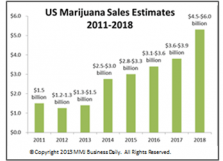To the uninitiated, “kombucha” may sound like the name of the latest dance craze sweeping the nation, or perhaps something you’d respond to by saying “bless you.” But it’s actually a type of fermented tea made with live bacteria and yeast that is soaring in popularity among health-conscious consumers.
To British Columbia-based Abattis Bioceuticals Corp., kombucha represents a huge opportunity to tap the medical and recreational marijuana markets in the United States. The publicly traded Canadian firm (ticker symbol ATTBF on the OTC market) is betting that US medical marijuana patients will quickly latch onto kombucha infused with cannabidiol (CBD), a compound derived from cannabis that provides some of the medical benefits associated with marijuana, minus the “high.”
The timing is ripe: Demand for CBD-infused products is growing among MMJ patients – according to the Marijuana Business Factbook – and that could cross over into the emerging recreational cannabis market in Colorado and Washington State as well. So it’s no wonder that Abattis sees a sizable market for CBD-infused kombucha.
The company plans to open a small facility in Boulder that will produce, infuse and bottle the beverage, which will be sold under the brand names Cannabucha Sun Rise and Cannabucha Sun Set. Abattis has teamed up with a company that makes a popular brand of kombucha beverages in Canada via a licensing agreement that will allow both businesses to expand into the US.
It’s a particularly interesting development because it shows how foreign firms are looking to tap the United States cannabis market. Expect to see more of these efforts in the future, especially as recreational cannabis shops open in Colorado and Washington State.
MMJ Business Daily spoke with Abattis CEO Mike Withrow about the company’s decision to manufacture and sell infused kombucha, why it chose Colorado for its new plant and the risks involved in entering the US market. Following are excerpts of that conversation, edited for length and clarity:
On why Abattis chose kombucha…
Kombucha is a natural health drink that is made from fermented tea. It can have different flavors in it derived from other known functional ingredients. We thought it was the perfect vehicle to deliver CBDs in. To start with, it is known to provide many health benefits, acting as a probiotic that improves intestinal gut health. A bottle a day is good for the immune system, and it provides a boost in energy. It’s also a fast-growing product segment as the market learns about it and embraces it.
On what it tastes like…
It’s very unique. Some are carbonated and some are not. But either way it’s fermented, so it’s brewed, and often there’s at least a small natural fizz to it. It can have different tastes, such as mango or ginger. Kombucha with CBD has a very subtle minty flavor. We will have six different flavors.
On the company’s plans in Colorado…
We will apply through a partner to get a marijuana-infused products license in Colorado so we can grow marijuana and extract CBD for use in the kombucha. It needs to be noted that we will work with a Coloradan to move forward. The team we have in place for this project has relationships with dispensaries in Colorado, and we hope to sell the beverage through dispensaries initially to test market acceptance.
On the facility in Colorado…
We’ll probably have a 3,000-4,000-square foot space where we’ll be fermenting tea for kombucha. The Colorado plant will include fermenting, bottling and infusion. It will be a GMP (Good Manufacturing Practice standards) facility. We’re all about food safety and setting the bar high so that the image we create is that we’re a mainstream beverage producer. Until we are able to grow at a federal legal level in the US we will have no choice but to import extracted CBD. We recently singed a distribution agreement with Cromogen, another foreign country looking at the US market. Abattis will be the distributor of the Cromogen CBDs once we have legal clearance.
On the timeline for the project…
I would say that by June of this year we should have equipment installed. It takes some time to do fermentation and to get the base ready for kombucha. We won’t be building a facility – we’ll use something that’s already in place. We’re working on finding a partner, and we’ve identified three (marijuana-infused products, or MIPs) license holders we could potentially link up with. We could have the product ready by September.
On the costs involved…
I believe it will be about $500,000 to get the first piece set up, and that includes staff, equipment for bottling and fermenting, etc. Initially we’ll probably have four employees there.
On the biggest challenges Abattis faces for this product…
The biggest risk is the unknown that exists in terms of whether CBDs are restricted by the Food and Drug Administration. We have concluded through our research that they are not. If the state of Colorado allows for marijuana-infused products to be sold, and the FDA isn’t cracking down on it, I think we can reasonably assume there’s been no crackdown because the FDA has no problem with it. And there are other companies in Colorado selling CBD-infused products, so the ice has been broken. We’re still looking to get some clarification on the DEA’s definition of marijuana. The one we have only lists material derived from cannabis sativa L.
On why the company chose Colorado…
One of the main reasons is because we have relations with people there, but also because it seems friendly to these types of operations and there’s a high potential of acceptance of these products in the marketplace. Washington State would also be ideal, because it’s just 20 minutes away. But we’re waiting to see what happens there. In Washington, it looks like recreational marijuana will go through the alcohol and tobacco division – which might license and manage the business end of it – meaning it would be much more regulated, and we support that.
On the target market…
I would say 90% of people who try kombucha love it. If someone is registered as a medical marijuana patient it’s because they believe in the cannabis-based compounds in general. If they have a very low-risk, high-reward product that they can consume, they will want it. The recreational marijuana market is probably even bigger. It’s a healthy beverage, and that appeals to everyone. At the beginning, we’ll probably stick to the medical marijuana market first. Eventually, though, we’d like to target the same demographic of consumers who shop at stores like Whole Foods.
We see a really big market in general. In Canada, the kombucha market is growing 40% year-over-year, and now it’s also growing in the U.S.
On what happens if the feds crack down on medical or recreational cannabis…
We would just not add CBD to the product; we would just make the primary beverage with functional attributes. We’re hedged that way a bit. As far as Arizona goes, we would probably convert the technology set up there to a licensed agreement with (a grower) to mitigate risk.




